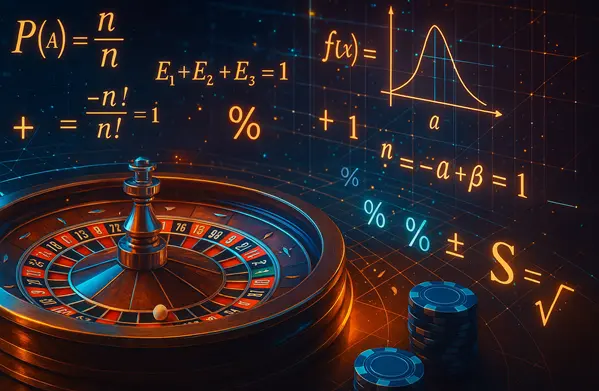Roulette stands out as one of the most iconic games in both land-based and digital casinos. With its spinning wheel and hypnotic rhythm, the game mixes simplicity with statistical complexity. While casual players might treat it as pure chance, those who take the time to explore its mechanics soon realize that roulette is deeply rooted in mathematical precision. Whether you’re playing at a luxury casino or testing your luck on the https://first.com/casino/roulette-sites , understanding the numbers behind the wheel can change how you approach every spin.
Roulette Basics: Wheel Variants and House Edge
There are two main types of roulette wheels: European and American. The difference lies in the number of pockets — and this small change makes a big impact on your odds.
| Wheel Type | Number of Pockets | House Edge |
| European | 37 (0–36) | 2.70% |
| American | 38 (0, 00–36) | 5.26% |
European roulette features a single zero, which slightly improves the player’s probability compared to the American version, which includes both a single and double zero. That extra green pocket increases the house advantage and lowers the return over time.
Understanding this setup is the first step toward making informed choices when selecting a game. Always check the version you’re playing — the layout may look the same, but your long-term expectations will differ.
Probability of Common Roulette Bets
Each bet in roulette comes with a fixed probability and payout. The key to playing smart is knowing not just what you could win, but how likely it is.
| Bet Type | Numbers Covered | Payout | Probability (European) |
| Straight (single) | 1 | 35 to 1 | 2.70% |
| Split | 2 | 17 to 1 | 5.41% |
| Street | 3 | 11 to 1 | 8.11% |
| Corner | 4 | 8 to 1 | 10.81% |
| Dozen | 12 | 2 to 1 | 32.43% |
| Red/Black | 18 | 1 to 1 | 48.65% |
| Even/Odd | 18 | 1 to 1 | 48.65% |
It’s easy to be lured by the 35-to-1 payout on a straight-up number bet. But with less than 3% chance of success, that’s not where consistency lies. Most seasoned players prefer outside bets — like red/black or odd/even — to increase their hit rate.
Expected Value and Why It Matters
Expected value (EV) is a key concept in roulette strategy. It represents the average amount a player can expect to win or lose per unit bet over the long run. In European roulette, no matter which bet type you place, the expected value is always negative due to the house edge.
For example:
- A straight-up bet: EV = (1/37 × 35) – (36/37 × 1) = –0.027, or –2.7%
- A red/black bet: EV = (18/37 × 1) – (19/37 × 1) = –0.027, or –2.7%
This means that over time, for every $100 wagered, you’ll lose an average of $2.70 in European roulette. That’s consistent across all bet types — which is why there’s no mathematical edge in switching between them randomly.
Roulette Strategies: Do They Make a Difference?
While you can’t change the math of the wheel, various betting systems attempt to manage risk, volatility, and betting flow. Most are based on progression — either increasing or decreasing your wager after a win or loss.
Popular strategies include:
- Martingale: Double your bet after every loss to recover with one win.
- Fibonacci: Follow a numerical sequence for bet sizing after losses.
- Labouchère: Create a number series and bet the sum of outer digits.
- D’Alembert: Increase or decrease your bet by one unit depending on outcome.
These systems create structure but don’t improve odds. They can extend gameplay or manage short-term swings, but they don’t overcome the house edge.
The Myth of Wheel Bias and Modern Casino Precision
In the past, skilled players could spot physical flaws or predict patterns from a biased wheel. In today’s regulated gaming environments — especially online — such opportunities are rare. Physical wheels are calibrated, monitored, and frequently rotated. RNG (Random Number Generator) software in digital versions further eliminates predictability.
Still, understanding math can help identify fair games. For instance, if an online roulette variant offers “La Partage” or “En Prison” rules on even-money bets (both exclusive to European tables), the house edge drops to 1.35%, improving your long-term outcomes.
Key Takeaways for Playing Smarter Roulette
Roulette is not about chasing a system or finding a loophole — it’s about knowing the math, managing your bankroll, and setting clear expectations. Players who treat it as a game of fixed odds and probability tend to enjoy a more controlled and rewarding experience.
Tips to keep in mind:
- Stick with European or French roulette when possible.
- Favor even-money bets if you want more frequent wins.
- Avoid high-risk bets unless you’re playing for entertainment, not return.
- Treat strategies as bankroll tools, not win guarantees.
- Track your wagers and set clear stop points.
Roulette is one of the most elegant casino games because it’s transparent. The odds are clear, the payouts are fixed, and every spin is independent. When you learn to think in percentages instead of just payouts, the game becomes less about luck — and more about balance.
Also Read-Exploring advanced techniques in independent financial trading


